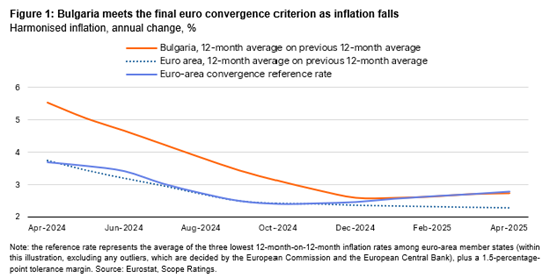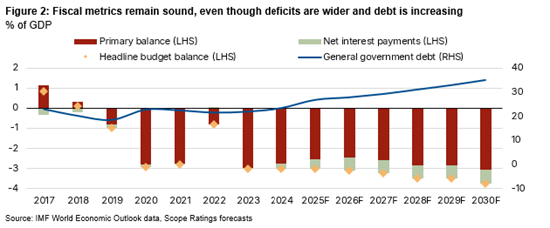Announcements
Drinks

Bulgaria on track to adopt the euro, supporting the economic outlook
By Dennis Shen and Brian Marly
Bulgaria’s adoption of the common currency would support potential growth of around 2.75% a year and accelerate convergence towards average European Union living standards.
Bulgaria formally requested that the European Commission (EC) and the European Central Bank (ECB) assess the country’s readiness for joining Economic and Monetary Union on 25 February. This represented a crucial step that placed the decision about accession in Europe’s hands, prudently distancing the decision from persistent domestic political divisions on the subject.
We expect the EC and ECB to approve Bulgaria’s accession by 8 July after next week’s publication of the special convergence report. Recent feedback from European institutions has favoured Bulgaria’s entrance. If successful, this would expand the euro area to 21 member states. The three most recent countries to join the euro are Croatia (sovereign rated A- and Stable Outlook; joined in 2023), Lithuania (A and Positive Outlook; 2015) and Latvia (A- and Stable Outlook; 2014).
Meeting of the inflation criterion underpins the accession case
Bulgaria’s efforts at controlling inflation have proven crucial in advancing its bid to join the single currency. Price stability has proven the most challenging of the core euro-convergence criteria over recent years. The harmonised annual inflation rate moderated to 2.8% in April from 4.0% in March. The 12-month-on-12-month rate – the convergence criterion – remained at 2.7% in April, broadly in line with the benchmark of the average of the three euro-area member states with the lowest rates of inflation (France, Cyprus and Luxembourg in April) plus a 1.5pp tolerance margin – totalling 2.8% (Figure 1).
Importantly, Bulgaria currently meets the inflation criterion even without the exclusion of “outlier” countries in the EC’s and ECB’s calculations – a factor that played a role in Croatia’s approval for entrance in 2022. In addition, Bulgaria has typically had comparatively modest inflation, a trend that may reassert itself. We forecast that consumer-price inflation will average an elevated 3.4% this year before falling to 1.6% next year.

Political divisions, amid calls to halt accession process, have proven the main risk to euro adoption
A primary risk to Bulgaria’s accession remains domestic political fragmentation. Sharp divisions between those favouring deeper integration within the EU and those preferring rapprochement with Russia were reflected in the seven general elections held since 2021. This split has compromised government reforms required for the adoption of the euro, resulting in years-long delays to the process.
Divisions persist within the governing coalition regarding the pace of accession while pro-Russian opposition group Vazrazhdane (Revival) has called for a referendum on euro adoption to seize on public unease about higher inflation, if Bulgaria joins the euro, and the fiscal challenges facing some euro area countries.
Pro-Russian President Rumen Radev has backed the idea of a referendum, but the right to call one rests with parliament where the majority of pro-euro parties have rejected the proposal. Radev has referred the matter to the Constitutional Court, but this is unlikely to disrupt the euro-accession timetable.
Fiscal position remains sound, although deficits have risen
Another concern for accession has been the government’s fiscal position. The country has a record of moderate budget deficits and comparatively low public debt, which recent increases in state spending on salaries, pensions, defence and measures to ease the cost-of-living crisis have challenged.
Nevertheless, the general government deficit was unchanged at 3.0% of GDP last year from the year before due to strong revenue growth (Figure 2). The authorities have committed to a budget deficit of 3.0% of GDP this year. General government debt will rise steadily, reaching 34% of GDP by 2030 from 24% at end-2024, though remaining among the lowest within the EU.
The EC favourably assessed Bulgaria’s medium-term fiscal-structural plan for 2025-2028 early this month, which is a positive step for euro adoption, suggesting public finances remain stable and sustainable.

Note: Dennis Shen represents Scope’s Macroeconomic Council, which brings together credit opinions from ratings teams across multiple issuer classes: sovereign and public sector, financial institutions, corporates, structured finance and project finance.






